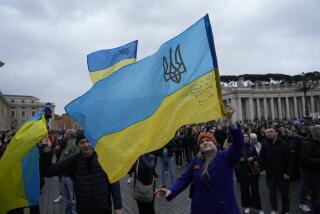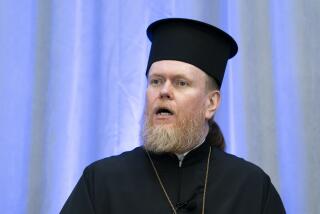Orthodox in Ukraine Spurn Pope’s Visit
KIEV, Ukraine — Pope John Paul II, starting one of the most delicate missions of his 23-year reign, urged Ukraine’s Roman Catholic and Orthodox Christian communities Saturday to bury centuries of religious feuding, and assured wary Orthodox believers that he had not come here to raid their flock in search of converts.
“Let us recognize our faults as we ask forgiveness for the errors committed in both the distant and recent past,” the pontiff from neighboring Poland said in fluent Ukrainian after he landed. “Let us in turn offer forgiveness for the wrongs endured.”
John Paul’s arrival for a five-day visit was preceded by days of street protests, as thousands of Orthodox faithful branded him the “forerunner of the anti-Christ.” The leader of Ukraine’s largest Orthodox church spurned his overture, refusing to meet him either at the airport or anywhere else during his stay.
The pope, whose preaching helped undermine communism, said he came to celebrate Ukraine’s spiritual revival in the decade since its break from a collapsing Soviet Union.
In a country teetering between Europe’s capitalist west and its post-Soviet east, John Paul urged Ukrainians to look back to a millennium of shared Christian heritage, the oldest in Eastern Europe, to help heal internal wounds and to shape a common future. That appeal echoed the pope’s other recent efforts--in Romania, Georgia and Greece--to mend the East-West schism that has divided Orthodox and Catholic believers since 1054.
But Ukraine’s reborn Catholicism identifies strongly with anti-Russian political nationalism, widening the rift between the Vatican and the Ukrainian Orthodox Church, which is subordinate to the Russian Orthodox Church in Moscow. Orthodox believers make up more than half of Ukraine’s population of 50 million, far outnumbering an estimated 6 million Catholics.
The two denominations’ main battleground is in western Ukraine, where John Paul will spend part of his visit. Some of Ukraine’s 5 million Greek Catholics, who practice an Eastern rite but are faithful to Rome, have seized churches there that had been taken away by Soviet dictator Josef Stalin and handed to the Moscow-aligned church.
A smaller number of faithful are reviving Roman Catholicism, in another source of tension with the Orthodox church.
Alexi II, patriarch of the Russian Orthodox Church, has asserted that battles for church property and followers are part of a Catholic “religious war” against his loyalists in western Ukraine. In recent months, he pleaded in vain for John Paul to postpone the visit until the dispute is settled.
“This [papal] visit will produce no peace, no stabilization, no improvement in relations between different confessions in Ukraine,” Alexi said Saturday during a trip to Belarus, another former Soviet republic.
Thin crowds greeted John Paul as he moved about Kiev in his glass-covered popemobile, and Orthodox church leaders asked protesters to cease their demonstrations. President Leonid D. Kuchma led a welcoming ceremony at Borispol airport along with a small group of VIPs, Catholic leaders, a military band and a formation of schoolchildren in colorful embroidered folk costumes.
No Orthodox leader was present to greet the pope. Metropolitan Vladimir, who leads the Moscow-aligned Orthodox believers here, declined an invitation to meet with him and left Kiev, the capital.
“If we embrace and give each other a brotherly kiss at a time when problems continue to exist and the people are suffering, it would look like a betrayal of Orthodoxy,” Vladimir told Russia’s RTR television in an interview Saturday.
The frail, 81-year-old John Paul tried to disarm his critics as soon as Kuchma led him by the elbow across the airport tarmac to a covered red podium.
“I come in love,” said John Paul, the first pope to visit Ukraine voluntarily. He noted in his arrival speech that two early popes were arrested during the Roman Empire and deported to Crimea, in what is now Ukraine, where they died as martyrs.
“As a pilgrim of peace and brotherhood,” he added, “I wish to assure [non-Catholics] that I have not come here with the intention of proselytizing, but to bear witness to Christ together with all Christians.”
For a pope, this was an extraordinary denial. John Paul was trying to clarify that his church does not--or at least should not--try to persuade Orthodox believers to defect to Catholicism.
“We want the Orthodox to remain Orthodox,” Cardinal Walter Kasper, the Vatican’s top ecumenical official, told reporters on the plane between Rome and Kiev. “We want to help them, not hurt them. The problem is that the Orthodox have a different definition of proselytism.”
While the Vatican asserts the right to set up churches wherever it finds believers, some Orthodox leaders regard their territory as sovereign and inviolable. The growth of Catholic communities, just like the arrival of the pope, is seen as an invasion.
This is John Paul’s first visit to a predominantly Orthodox country against the wishes of its largest Orthodox church. Vatican officials tried but failed to have the pope invited by Vladimir; he eventually came as the guest of Kuchma and both branches of the country’s Catholic Church.
“The 6 million Catholics in Ukraine have a right to see their pope after all the martyrdom they have endured,” Kasper said. “The Orthodox don’t have a right to veto.”
John Paul did not mention any specific “faults” committed by Catholics against Orthodox believers, as he did in Greece last month when he apologized for the sack of their 13th century capital, Constantinople, by Catholic Crusaders. But Catholic leaders have acknowledged the violent takeovers of Orthodox church property in Ukraine.
At the same time, Vatican officials say that such violence has stopped and that the lingering property disputes in western Ukraine are minor and can be handled locally without hurting ties between the two church hierarchies.
A split in the Orthodox ranks complicates the religious strife. Two Ukrainian nationalist factions have split from the Moscow-aligned Orthodox church, and their leaders have spoken favorably about the pope’s visit.
Orthodox Christian believers had mixed reactions Saturday to the pope’s call for mutual forgiveness.
“I don’t care what he said,” huffed Nadzhda Ivanova, 55, who came from Odessa to take part in last week’s anti-papal protests. John Paul’s visit, she added, “is spiritual aggression.”
“I can only welcome him,” said Laryssa Fomenko, 58, who was buying cornmeal Saturday at one of Kiev’s farmers markets. “It’s a step toward friendship. This means we’re entering civilization. We’re going forward.” She dismissed the protesters as “fanatics.”
Surveys showed most Ukrainians favoring the pope’s visit and about 4% opposed.
*
Special correspondent Mary Mycio contributed to this report.
More to Read
Sign up for Essential California
The most important California stories and recommendations in your inbox every morning.
You may occasionally receive promotional content from the Los Angeles Times.










